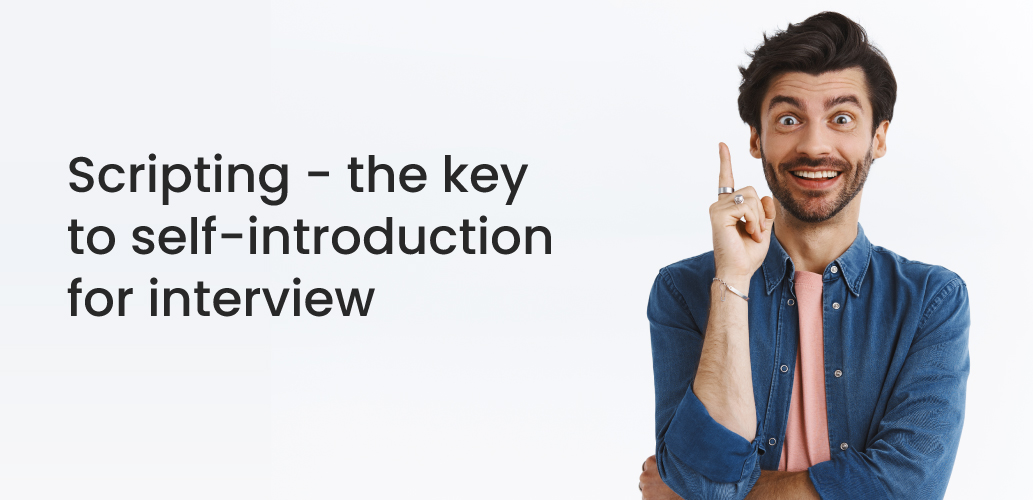Blog > Guide On Strengths and Weaknesses To Crack Your Job Interviews
Guide On Strengths and Weaknesses To Crack Your Job Interviews
November 9th, 2022

Almost every interview you sit for is going to eventually lead you to discuss your strengths and weaknesses. There is simply no way out of this situation, and like with any other question, you get to put your greatest strengths in the limelight and get to show how much you are willing to grow with your weaknesses.
Everybody has strengths and weaknesses we know about ourselves, but not all those are interview appropriate. The key to answering questions of this kind is balance.
Read this blog to learn how to answer this question, why you are asked about your strength and weaknesses in job interviews and what are some strengths and weaknesses examples you can give when posed with this question.
Before we jump to this question, let's first understand how to answer and ace interview questions as a whole.
Scripting - the key to self-introduction for interviews

This may come as a surprise for some of you, and we bet y'all are wondering should we be scripting our answers?
And the answer to this question is a resounding YES!
By scripting we mean, preparing or pre-writing an interview answer. You absolutely should be scripting answers to standard questions for your interviews beforehand. And the question "what are your strengths and weaknesses" are as standard as they come. In fact, answers to any question that will provide an introduction to yourself to the interviewer should be scripted prior to the interview.
What we don't recommend however is trying to memorise these scripted answers word-for-word. This will just lead you to sound rehearsed when instead you want to sound candid - one of the most common mistakes freshers make during their interview. Scripting your answers beforehand will help you organise your thoughts beforehand. It will give you a rough flow of points from start to finish, so that you can tie up the end of your answer neatly and not end it haphazardly.
So how do you script answers better? These are our top tips:
- Prepare a list of the most frequently asked questions in the field you're applying to. And script answers for those select few questions, since they have a higher chance of being asked.
- Once you script your answer, practise them out loud to see how naturally they're flowing for you. And go back and make any changes required to the answer.
- As we mentioned above DO NOT memorise these answers, this will throw you off if the answers you memorised are not asked.
- In order to check how you sound, you could also record your answers and go back and check how well your answers are flowing.
- When it comes to the actual interview, just make up an answer as you go - based on the main points of the answer you scripted.
- If you want to go a step further you can also schedule a mock HR interview with an interview coach. This way you'll be much more comfortable answering questions in a foreign environment.
Now that we understand how to script better answers, let's go back to addressing your strengths and weaknesses in an interview.
Interviewer's favourite - What are your strengths and weaknesses?

The topic of strengths and weaknesses may seem daunting to most and it certainly is tricky to talk about them. However interviewers ask about your strengths and weaknesses often to evaluate a few things about you:
- How well do you know yourself
- Based on your answer, whether you're fit for the team
- Whether or not you assess yourself
- What your approach is, to make up for your weaknesses
- What new skills and traits will you bring to the team
As you can see there is a lot you have to keep in mind when you answer the question - "What are your strengths and weaknesses?"
How to answer - What are your strengths?

To answer this question, it is important to put yourself in the shoes of the interviewer. What strengths do you think the interviewer is looking for? You will get a general idea of this by reading the description of the job role you're applying for. Depending on what you come up with, you can then align your strengths to match their expectations.
For example, if you're looking to apply for the role of Product Manager, organisational ability is a skill you'd like to showcase.
When you answer this question, be confident. This is your chance to highlight positive traits. However, refrain from bragging about how good you are at xyz tasks. It's never a good look and unless your interviewer is equally pompous, they are least likely to get impressed. Instead be straightforward and humble, talk about strengths and provide scenarios where you used them.
A sample response for this question would look like this:
"One of my greatest strengths is my organisational skill. I learned this through [story of how you developed this], and this allowed me to [example of what you achieved using this strength] at my current/previous job/experience."
As you can see this format is a bit direct and straightforward, however it gives you the leeway to add a personal touch in the form of a story or an experience. You should always follow up your strengths with an example of a situation where you put them to use and what the resulting outcome was.
If you're having a hard time pointing out your strengths, we've put together a list of possible strengths, and you can pick one or two (we're generous like that) and elaborate on them.
A list of possible soft skills you can use as Strengths:
- Detail-oriented
- Accuracy
- Time Management
- Good at negotiation
- Flexible
- Quick to Adapt
- Quick study / Fast learner
- Empathetic
- Disciplined
- Excellent at communicating
- Innovative
- Creative
- Problem solver
- Open to criticism
- Persuasive
- Interpersonal skills / a Team player
- Strong work ethic
- Leadership
Apart from these soft skills, you should definitely add hard skills or technical skills that are relevant to your field and back it up with some credible work experience like projects, etc.
How to answer - What are your weaknesses?

We all have weaknesses and flaws - just a part of being a human being.
But our ability to recognise these weaknesses and work upon them is what differentiates us from each other. And ultimately this is what recruiters are looking for - how do you overcome your shortcomings.
Similar to your strengths, the key to talking about your weaknesses is combining self-awareness with an action and the resulting outcome.
- Talk about the weakness - what is it?
- What you did overcome this weakness - with a story.
- How did that improve your weakness (result)
It's important to note that recruiters don't always ask this question so directly. Instead they may ask you:
- If you could change something about yourself what would you change?
- What does the ideal version of yourself look like?
- How do you bounce back after mistakes?
- If your current mentor had to name a weakness of yours, what would they say?
Owning up to your weaknesses is a sign of growth in itself and is more attractive to your hiring managers, rather than saying you have no flaws. So when posed with this question, this should be the outline of your answer:
"During my career I would often struggle with [weakness]. I have come a long way after I did X activity to improve myself. [Follow up with a story of how you managed your weakness.]"
When you script an answer for this question, ensure that you pick a weakness that allows you to demonstrate your growth and your fervour to keep learning from your mistakes
In case you're stuck coming up with a weakness you can elaborate on, we have a few listed for you. Pick the ones that you can elaborate on with a story of improvement:
- Self-critical
- Insecure
- Disorganised
- Prone to procrastination
- Uncomfortable speaking in front of a crowd
- Uncomfortable with task delegation
- Risk-averse
- Competitive
- Sensitive to criticism
- Extreme introversion or extroversion
- Limited experience in a particular skill or software
When you pick a weakness, make sure you pick one where you have shown improvement, so that you can demonstrate your growth to your hiring manager.
Conclusion

Your strengths and weaknesses matter to recruiters, because from these answers they can assess whether or not you are a suitable candidate and whether or not you'll be a good fit for the team. They also like to see whether or not you're capable of assessing yourself.
When choosing a strength or weakness, choose one that allows you to elaborate in the form of a story on how you either used that particular strength or overcame your weakness
If you want to learn more about HR interview questions like this, upGrad Campus offers Placement Plus and Internship Plus with all its courses. You can expect complete career guidance, from Resume building to mock HR interviews, making you100% ready for your first job.






Add a Comment